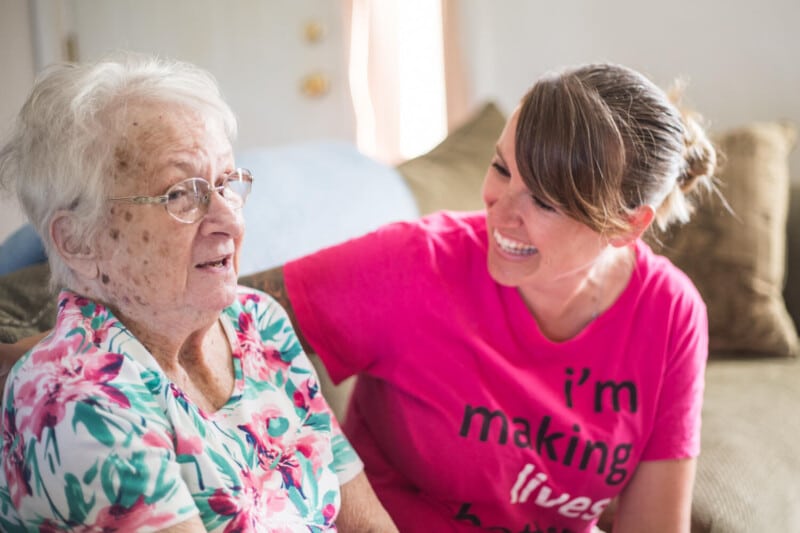The demand for quality home care services is skyrocketing as the global population ages. The worldwide home healthcare market, valued at an astounding $299 billion in 2020, shows no signs of slowing down. For visionary entrepreneurs, this presents a golden opportunity to make a positive impact in the lives of many while building a thriving business. Whether you are considering starting a home health care service from scratch or partnering with an established franchise, one essential element you cannot overlook is a meticulously crafted home care business plan.
A home care business plan is not just a document; it is the blueprint that guides your business decisions, impresses potential investors, and lays the foundation for your agency’s success. Securing financing, in particular, hinges on your ability to demonstrate a well-thought-out plan that promises profitability and sustainability.
In this guide, we’re here to walk you through the eight critical steps for creating a successful home care business plan. With these insights, you’ll be equipped to navigate the complexities of the home care industry and launch a business that promotes both profit and purpose.
Understanding the Importance of a Home Care Business Plan
Defining a Home Care Business Plan
A home care business plan is a vital document that guides the establishment and management of a home health care business. It lays down the objectives, strategies, financial projections, and market analysis that are essential for the smooth operation of your business.
This roadmap is essential for ensuring that your business is well-positioned to offer a range of home care services, such as post-operative care, Alzheimer’s care, and skilled-nursing services.
The Critical Role it Plays
Why is a home care business plan so indispensable? Firstly, it forms the foundation for your business operations. Your business plan acts as a blueprint for managing cash flow and resources, essential for providing top-notch services. It also outlines the legal structure of your home health care agency, ensuring compliance and seamless operations.
Secondly, a solid business plan helps in securing bank loans and attracting investors. By demonstrating your commitment to providing affordable home health care and showcasing your business’s financial health, you present yourself as a viable investment.
Laying the Groundwork: The Pre-Planning Stage
Setting Clear Goals
Before you dive into the specifics of your home care business plan, it’s super important to know what you really want to achieve with your home health care business. Think about it like a roadmap – you need to know where you’re going! Here’s what you should consider:
Helping the Community: A lot of people want to start a home health care business because they care. With more senior citizens in the neighborhoods, there’s a huge need for services that help them lead a happy and healthy life.
Offering Different Services: Maybe you want to provide a range of services. Like, not just basic care, but also physical therapy, skilled-nursing care, or end-of-life care. This way, you can help all sorts of people with different health needs.
Making Connections: It’s a great idea to team up with hospitals and doctors. By building strong relationships with other medical professionals, you can make your services even better. Plus, it’s always good to have friends in the business.
Making Money While Doing Good: Yes, you want to help people, but you also need to make a living. So, part of your goal might be to create a business that makes money. That way, you can keep the doors open and continue to provide awesome care for a long time.
Franchising: Some people don’t want to start from scratch—and that’s OK! You can get in on a franchise and use a name that people already know and trust. This can be a kick-start for your business.
Personal Touch: For some, the heart of the home health care business is in giving clients that personal touch. It’s not just about healthcare; it’s about making someone’s day better.
Don’t forget; it’s smart to make sure your goals are SMART – which means Specific, Measurable, Achievable, Relevant, and Time-bound. It’s like a checklist to make sure your goals aren’t just dreams, but something you can really achieve!
Knowing Your Audience
Another essential pre-planning step is knowing who will read your business plan. Will it be potential investors, banking officials, or medical professionals looking for collaboration? Tailoring your home care business plan to suit the interests and concerns of the audience reading your business plan is vital for effective communication.
Staying Informed About the Industry
Staying informed about the home health care industry is fundamental to your business’s success. Engaging in market research will equip you with insights into the demands, challenges, and opportunities in the industry. Here are three reputable sources to get you started:
- Home Health Care News for the latest updates, data, and trends, covering policy changes to innovations.
- National Association for Home Care & Hospice (NAHC) for educational materials, research, and networking opportunities.
- The Joint Commission for resources on quality and safety standards.
Use this information to identify market strengths, weaknesses, and gaps that your business can address, ensuring that your home care business plan remains adaptable and responsive to the evolving industry landscape.
Crafting Your Home Care Business Plan: Key Components
1. Executive Summary: Capturing Attention from the Get-Go
Your executive summary is the opening act of your home care business plan and should be designed to capture attention immediately. Within this section, succinctly outline your business mission, the home care services you’ll be offering, and how your business will fill a specific need in the market.
For instance, you might focus on providing skilled home health services to seniors or specialize in Alzheimer’s and dementia care. Remember that with an aging population, the home care industry is competitive. A compelling executive summary will set your business apart and entice readers to dive deeper into your business plan.
2. Company Description: Defining Your Home Care Business Identity
In this section of your home care business plan, provide a detailed description of your home health care company. Discuss the types of home health care services you aim to provide, be it personal care, nursing services, or occupational therapy. Be sure to mention how your services cater to the demands of the aging population.
Outline your goals, target market, and how your home care agency will stand out from others. If you have a unique approach, highlight that as part of your competitive advantage.
3. Industry Analysis: Navigating the Home Care Market
An in-depth industry analysis is vital for understanding the landscape of the home health care market. This section should include market research, trends in the health care industry, and an analysis of competitors. Identify the needs of your target customers and the gaps in the services provided by existing home health care agencies.
Are there unmet needs in terms of physical therapy or end-of-life care services? Knowing the industry inside out will enable you to position your home care business strategically within the market.
4. Management and Organization: Building a Strong Team
A successful home health care business relies on a strong team. In this section, describe the structure of your home health care agency. Detail the roles of the healthcare professionals, including skilled nurses, caregivers, medical social workers, and any other medical professionals involved in providing in-home services.
Define the qualifications and experience needed for each role. Explain how your home health care team will contribute to the success of your business and the provision of high-quality care to your clientele. It’s essential to portray the strength and competence of your team in fulfilling the growing needs of the aging population.
5. Service Offerings: Detailing Your Home Health Care Services
In this part of your home care business plan, provide a comprehensive list of the home health care services that your business will offer. These might include skilled nursing care, physical therapy, speech therapy, and personal care, among others. Describe how your home care business will meet the diverse needs of the aging population, and specify how your services will differ from those provided by other home health care businesses.
For instance, if you plan on including specialized skilled-nursing services or employing occupational therapists, make it a point to highlight these as part of your unique service offerings.
6. Marketing Plan: Reaching Your Target Audience
Your marketing plan is crucial for the success of your home care business. Begin by identifying your target market – is it seniors, clients recovering from surgery, or individuals requiring companionship? Next, outline your marketing and recruitment strategies.
How will you reach your target customers? What channels will you use? Consider both traditional avenues and digital platforms. Mention any partnerships with medical professionals or hospitals that could drive referrals. Additionally, discuss how you plan to brand your business and communicate the value of your home health care services effectively.
Take us, for example. Here at Nurse Next Door, we wear our hearts on our sleeves. Our mantra, “Happier Aging™,” is the heartbeat of our branding. We’re all about connecting with families and sprinkling some joy in the mix. Our popping pink? That’s the color of positivity, love, and care. But we know it’s not just about looking pretty – it’s about action.
Our dedication is to create tailor-made experiences that fill our clients’ lives with happiness. By marrying our vibrant spirit with a deep commitment to care, we like to think we’ve made Nurse Next Door a little piece of home in the home care industry.
7. Financial Projections: Mapping Out Your Financial Future
Financial projections are a critical aspect of your home care business plan, as they give potential investors or lenders insight into the financial viability of your home health care agency. In this section, outline your revenue model, pricing structure, and expected expenses, including salaries for medical professionals and costs for any expensive medical equipment.
Provide detailed financial statements, including projected income statements, balance sheets, and cash flow statements. By giving a clear picture of your expected cash flow, you will demonstrate that your home care business is a sound investment.
8. Appendix: Supporting Documents and Additional Resources
The appendix of your home care business plan should contain all the supporting documents that provide additional details not included in the main sections. This might include resumes of your home health care team, details of your legal structure, licenses, and permits, contracts with medical professionals, or hospital insurance information.
Also, if you have any endorsements from industry associations, certificates, or awards, include them here. This section adds credibility to your home health care business and acts as a repository for information that interested parties may seek for further understanding or validation of your business operations.
Implementing Your Home Care Business Plan for Long-Term Success
Implementing your home care business plan is an ongoing process that doesn’t end once the plan is written. It’s crucial to monitor, evaluate, and adapt your business plan according to the changing market conditions in the home health care industry.
Monitoring and Adapting Your Business Plan
Regularly review your home health care business plan to ensure that your business operations are aligned with your goals. Keep an eye on the cash flow and make necessary adjustments to stay financially healthy. Monitor your marketing plan’s effectiveness and adapt strategies as needed. Stay informed about changes in the home care industry, and be ready to pivot your services or approach to meet new demands or regulatory requirements. This adaptive approach is essential to ensure the sustainability of your home health care business.
Seeking Professional Advice and Mentorship
Embarking on this fulfilling journey as a business owner in the home health care business is an exciting step, and it’s always wise to have some expert advice along the way. Tap into the wealth of knowledge that industry veterans possess by engaging with them, and consider joining local groups or enlisting the guidance of a qualified clinical supervisor. These interactions are like having a knowledgeable GPS guiding you through the twists and turns of running a thriving home health care agency.
Additionally, let’s not forget the magic that happens when professionals collaborate. Building connections with other medical professionals is like adding extra horsepower to your business engine. It provides you with invaluable insights and helps establish a robust network for your home health care company. And if you’re looking for an extra boost, considering a partnership with a franchise could be just the ticket.
Partnering with an established franchise such as Nurse Next Door offers you a supportive backbone enriched with resources and expertise to help you make a real difference in your community through exceptional home health care services. Let’s make lives better, together!
Key Takeaways
In a nutshell, starting and running a successful home health care business requires careful planning, continuous monitoring, and adaptability to industry changes. Your home care business plan serves as the compass guiding your journey. Ensure it includes a concise executive summary, a comprehensive company description, a thorough industry analysis, clearly defined service offerings, an effective marketing plan, and realistic financial projections.
Remember the value of networking and seeking guidance from experienced professionals in the home health care services field. Stay focused on your goals, embrace innovation, and be passionate about delivering high-quality care. By doing so, you can make a meaningful difference in the lives of seniors and establish a thriving home health care business.
Are you ready to embark on a mission of providing exceptional care to seniors or those in need of care in your community? Don’t wait any longer! Take the first step today by exploring the Nurse Next Door franchising opportunities.
As a Nurse Next Door franchisee, you’ll have the support and resources of a trusted brand behind you, empowering you to make a positive impact on the lives of seniors while building a successful business. Join us in creating a healthier and happier community where you live.
Together, let’s make a difference!

 x
x










